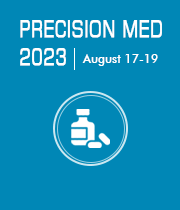Deborah Shelton, Appendix Cancer PMP (ACPMP) Research Foundation, United States
Appendiceal cancer is a rare cancer for which there is critical unmet medical need. Although it is a rare cancer, findings from a 2020 study reflect that the overall incidence of malignant appendiceal tumors has significantly increased in the U.S. and Canada from 2000 to 2016. &n [....] » Read More




Title : The use of anti seizure medication therapeutic blood level determination to personalise the treatment of epileptic seizures especially in patients attending the accident and emergency department
Roy Gary Beran, University of New South Wales, Australia
Will be Updated Soon...
Title : Personalized and precision medicine (PPM) can be established as a unique healthcare model through biodesign-driven and inspired biotech, translational applications. This approach aims to ensure human healthcare, wellness, and biosafety.
Sergey Suchkov, Institute for Biotech & Global Health of RosBioTech and A.I. Evdokimov MGMSU, Russian Federation
A new and upgraded approach to the diseased states and wellness, and to re-shape tomorrow’s healthcare whilst doing it today, resulted in a new global trend in the healthcare services, namely, Personalized and Precision Medicine (PPM). PPM as a Unique Entity demonstrating a [....] » Read More
Title : Pharmacogenomics: current status and future directions
Matthias Schwab, University of Tubingen, Germany
The goal of personalized medicine is to provide individualized treatment and to predict the clinical outcome of different treatments in different patients. Pharmacogenomics (PGx) is one of the core elements in personalized medicine. The basic concept is that interindividual varia [....] » Read More
Title : Designing and managing intelligent and interoperable precision medicine ecosystems.
Bernd Blobel, University of Regensburg, Germany
For meeting the financial, quality and safety challenges as well as expectations of the patients, health and social care systems around the globe currently undergo a transformation towards personalized, preventive, predictive, participative precision medicine (5PM), supported by [....] » Read More
Title : Monitoring folds localization in ultra-thin transition metal dichalcogenides using optical harmonic generation
Ahmed Raza Khan, Australian National University, Australia
Folding is an effective technique to alter the optoelectronic properties of two-dimensional (2D) materials such as interlayer coupling, bandgap, etc. Optical techniques such as PL, Raman were used in the past to probe the folds localization. Here, we show that optical second harm [....] » Read More
Title : A systematic review of regulatory approaches for Direct- To- Consumers (DTC) genetic testing
Kavitha Palaniappan, Duke-NUS Medical School, Singapore
Background: Genetic testing can be categorised into clinical and non-clinical genetic testing. A clinical genetic testing involves predictive screening or testing for a disease as well as purposes that purport to assess, diagnose, prevent, alleviate or treat a medical condition [....] » Read More
Title : Regulatory framework of in vitro diagnostic and artificial intelligence for precision medicine
Pei Ting Sarah Chou, Regulatory Affairs Professionals Society, Taiwan
First, the existing regulatory frameworks for in vitro diagnostic and artificial intelligence medicinal products will be examined. Among those medicinal products of in vitro diagnostic and artificial intelligence, the ones characterized as precision medicine, or personalized medi [....] » Read More
Title : Unraveling cancer stem cell signatures in circulating tumor cells of metastatic colorectal cancer: Investigating ALDH1A1 and the repurposing potential of disulfiram via scRNA-seq
Nurul Syakima Ab Mutalib, Universiti Kebangsaan Malaysia, Malaysia
Colorectal cancer (CRC) metastasis remains a significant challenge, and the presence of cancer stem cells (CSCs) within circulating tumor cells (CTCs) plays a critical role in this process. This study aimed to unravel the cancer stem cell signatures in CTCs of metastatic colorect [....] » Read More
Title : Deciphering tumour heterogeneity and transcriptomic profiles of circulating tumor cells in archived metastatic colorectal cancer samples via single-cell mRNA sequencing
Francis Tieng Yew Fu, Universiti Kebangsaan Malaysia, Malaysia
Molecular single-cell analyses have revolutionised the current understanding of complex biological processes by revealing rare cell populations, including circulating tumour cells (CTCs), that were previously masked by bulk analyses. While CTCs have proven to be valuable prognost [....] » Read More
Title : Genome editing for precision medicine: Revolutionizing medicine
Yuji Yokouchi, Kumamoto University, Japan
Precision medicine refers to personalized medicine that provides medical care tailored to the individual based on his or her individual constitution. One of the promising tools is genome editing with CRISPR-Cas system, which enables modification of specific genes in an individual [....] » Read More
Title : Single-cell transcriptomics reveals multiple chemoresistant properties in leukemic stem and progenitor cells in pediatric AML
Fuhong He, Beijing Institute of Genomics, China
Cancer patients can achieve dramatic responses to chemotherapy yet retain resistant tumor cells, which ultimately results in relapse. Although xenograft model studies have identified several cellular and molecular features that are associated with chemoresistance in acute myeloid [....] » Read More
Title : Genetic variants of the CITED2 gene promoter in sporadic tetralogy of fallot patients with clinical implications
Guo Wei He, Tianjin University, China
Background: Tetralogy of Fallot (TOF) is a common congenital heart malformation. Genetic variants in the CITED2 coding region is known to be significantly associated with cardiac malformation, but the role of variants in the CITED2 promoter region in the development of TOF remain [....] » Read More
Title : Time-ordered comorbidity correlations identify patients at risk of mis- and overdiagnosis
Isabella Friis Jorgensen , University of Copenhagen, Denmark
Unfortunately, diagnostic errors are common, and the increasing co-occurrence of diseases also increases the risk of erroneous diagnoses. We present a data-driven, generic approach for identifying patients potentially at risk of being mis- or over-diagnosed, here exemplified by C [....] » Read More
Title : Mitochondrial RNAs as potential biomarkers of functional impairment in diabetic kidney disease
Stefania Di Mauro, University of Catania, Italy
Background: Type 2 diabetes and renal damage are strictly linked. The progressive increase in T2D incidence has stimulated the interest in novel biomarkers to improve the diagnostic performance of commonly utilized markers such as albuminuria and eGFR. Methods: Through [....] » Read More
Title : Precision treatment of alzheimer's
Boris Tankhilevich, Magtera, Inc., United States
(I) Alzheimer's Disease Facts and Figures, an annual report released by the Alzheimer's Association, reveals the burden of Alzheimer's and dementia on individuals, caregivers, government and the nation's health care system. Per the special report, More Than Normal [....] » Read More
Title : Artificial intelligence and precision medicine: A perfect combination
Thomas Webster, Interstellar Therapeutics, United States
Artificial intelligence has already changed the world. Here, this invited talk, will provide a review of how artificial intelligence (AI) can be used in medicine. By learning from how patients respond to certain therapies, AI can be used to predict clinical outcomes for that spec [....] » Read More
Title : Pharmacogenomic-guided therapy: Insights from n-acetyltransferase 2 genetic polymorphism
David W Hein, University of Louisville, United States
Recent investigations more clearly define the effects of N-acetyltransferase 2 (NAT2) haplotypes and genotypes on the expression of acetylator phenotype towards selected drugs within human hepatocytes in vitro, within human hepatocyte cultures in situ, and clinical measures such [....] » Read More
Title : Deficiency of the splicing factor RBM10 limits EGFR inhibitor response in EGFR-mutant lung cancer
Wei Wu, UCSF, United States
Molecularly targeted cancer therapy has improved outcomes for patients with cancer with targetable oncoproteins, such as mutant EGFR in lung cancer. Yet, the long-term survival of these patients remains limited, because treatment responses are typically incomplete. One potential [....] » Read More
Title : Platelet to lymphocyte ratio (PLR) and its association with heart failure clinical outcomes; A systematic review and meta-analysis
Mehrbod Vakhshoori, Loma Linda University, United States
Background: Inflammation is believed to play a role in the pathogenesis of heart failure (HF). However, the potential role of platelet-to-lymphocyte ratio (PLR) as a novel biomarker for assessing HF prognosis requires further investigation. The aim of this study was to evaluate t [....] » Read More
Title : Gain spatial biology insight via graph-based artificial intelligence
Qianqian Song, Wake Forest University School of Medicine, United States
Cell–cell communications are vital for biological signaling and play important roles in complex diseases. Recent advances in single cell spatial transcriptomics (SCST) technologies allow examining the spatial cell communication landscapes and hold the promise for disentangl [....] » Read More
Title : A novel mechanism to inhibit NF-kB and enhance chemotherapy efficacy in breast cancer.
Arun Rishi, Wayne State University, United States
NF-κB is a pro-inflammatory transcription factor that regulates pathways for DNA Damage repair, cell survival and apoptosis, and contributes to emergence of resistance to genotoxic chemotherapy in a variety of cancers. Cell cycle and apoptosis regulatory protein 1 (CARP-1 o [....] » Read More
Title : Development of recombinant VSV-based oncolytics for cancer immunotherapy
Ekaterina Minskaia, Sirius University of Science and Technology, Russian Federation
Oncolytic viruses (OV) are a relatively novel class of anti-tumor therapies. Their selective replication in tumor cells and activation of the host immune response lead to the death of only malignant cells setting OV-based therapies apart from the non-specific conventional chemo-/ [....] » Read More
Title : Pulmonary adenocarcinoma: Questioning six years follow up of resistance mutations with anti- ALK therapy – case report
Lina Carvalho, Faculty of Medicine of the University of Coimbra, Portugal
ALK rearrangements are detected in 2–5% of NSCLCs (85% correspond to EML4-ALK) sensitive to ALK TKIs; resistance mutations schedule is unknown. A case demonstrates NGS as the actual methodology for recognition of rearrangements, amplifications, and point mutations. Metho [....] » Read More